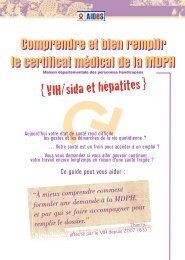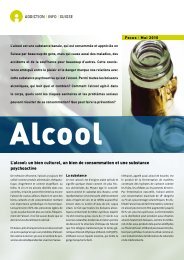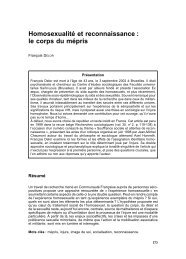Care and support for people living with HIV/AIDS
Care and support for people living with HIV/AIDS
Care and support for people living with HIV/AIDS
Create successful ePaper yourself
Turn your PDF publications into a flip-book with our unique Google optimized e-Paper software.
National responses to the epidemic: factors that make a differencethan 5 million new infections annually. Furthermore, increases in donor <strong>support</strong> hadbegun to level off between 1996 <strong>and</strong> 1998, <strong>and</strong> it remains less than just 1% of donorcountries’ total annual ODA budgets. Against the backdrop of soaring infection rates,this trend is of critical concern.However, recent indications from donors are encouraging. For example, funding bythe United States <strong>for</strong> global <strong>HIV</strong>/<strong>AIDS</strong> activities increased by US$ 65 million in 2000<strong>and</strong> is set to increase by as much as an additional US$ 100 million in 2001. The donorresponse to the International Partnership Against <strong>AIDS</strong> in Africa has also been positive.This important new initiative – the objectives of which are to curtail the spreadof <strong>HIV</strong>, reduce its impact on human suffering <strong>and</strong> halt the reversal of social <strong>and</strong> economicdevelopment in Africa – includes donors as one of its five key constituencies.Representatives of donor countries are participating in all phases of its development,<strong>and</strong> their greater underst<strong>and</strong>ing of, <strong>and</strong> involvement in, national planning processesare paying off in increased <strong>support</strong>.In addition, there is increasing recognition that <strong>HIV</strong>/<strong>AIDS</strong> is not only a major threat todevelopment, but also a threat to peace-building <strong>and</strong> human security in Africa. Thishas resulted in higher levels of political awareness <strong>and</strong> more substantial financial commitments.An additional US$ 180 million in donor funding <strong>for</strong> activities in Africa wasannounced at the historic Security Council meeting in January 2000. The challenge isto ensure that this growing enthusiasm results in a steady increase in concrete <strong>support</strong>to national <strong>HIV</strong>/<strong>AIDS</strong> prevention <strong>and</strong> control programmes – in Africa <strong>and</strong> elsewhere.To do this, emphasis must be placed on building partnerships between donors<strong>and</strong> the most-affected countries. In this way a sense of shared responsibility can becreated both <strong>for</strong> improving prevention <strong>and</strong> care as well as <strong>for</strong> addressing the <strong>for</strong>midable,multifaceted development challenges this epidemic presents.9. Adequate resourcesThe reassignment of national priorities must be reflected in a reallocation of budgets.There are success stories in developing countries where government budgets<strong>for</strong> <strong>AIDS</strong> have been increased significantly; <strong>for</strong> example in Brazil, China, India <strong>and</strong>Thail<strong>and</strong>. At the same time, however, it is a fallacy to assume that because designated<strong>AIDS</strong> funding is limited, so must <strong>AIDS</strong> action be. Effective programmes identifyopportunities to involve partners <strong>with</strong> similar goals <strong>and</strong> objectives, <strong>and</strong> capitalizeon synergies between <strong>AIDS</strong> <strong>and</strong> other programmes. If the action needed <strong>for</strong> riskreduction<strong>and</strong> vulnerability-reduction becomes part of the mainstream of nationallife, direct costs will be less, the benefits will have many spin-offs, <strong>and</strong> programmesare more likely to be sustainable. For example, including in<strong>for</strong>mation on <strong>HIV</strong>/STDs<strong>and</strong> life skills in a school curriculum has only marginal costs, but the resulting decision-making<strong>and</strong> negotiation skills may bring about extra benefits such as declinesin STDs, unwanted pregnancies <strong>and</strong> drug use. Similarly, boosting the educational113











